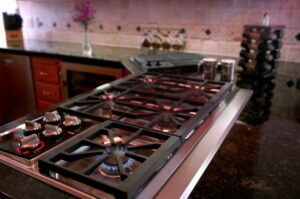Our team does not just provide service for your gas lines. We also provide service for all of the gas appliances in your home, including when your gas oven won’t stay lit. No matter what your gas service problem, our team is here to help.
You can keep reading to learn more about the most frequently asked questions we get regarding gas stoves. Then you can give our team a call to schedule service if you have a gas stove or other gas appliances that aren’t operating quite the way they should.
Can I install a gas stove myself?
No. Anything having to do with your gas lines requires a plumber, who is also a certified gas line technician. Because plumbing lines and gas lines are so similar, plumbers have the additional education needed to work on gas lines. Even if you already have an existing gas line in place, a professional needs to handle the process of connecting the gas lines to your new stove. It’s the law.
What does BTU stand for?
The acronym BTU stands for British Thermal Units and provides an estimate of how much heat can be produced from the energy source, in this case, gas. The higher the BTU rating, the more heat that your stove will produce. The burners on gas stoves usually range between a BTU of 2,000 to a BTU of 18,000. Some stoves do have even higher BTU ratings and get even hotter. Most residential gas stoves have a combination of smaller and larger burners.
How much space should there be between a gas stove and the wall?
When we install your gas stove, we will leave at least two inches of space behind it. If you ever need to move your stove, make sure that you maintain a minimum of two inches of space for safety reasons. It’s tempting to push your stove back further if it seems like it’s far away from the wall, but that space is crucial for the gas connections.
Do I need to protect the floor under my gas stove?
The floor under your stove does not need any type of protection. Exhaust from your gas stove will not blow onto or otherwise impact the floor. Gas stoves are designed similarly to any other stove to contain heat effectively without negatively impacting the surrounding floor and cabinets. Gas stoves also have ventilation in place to help remove exhaust from your home.
Does a gas stove require carbon monoxide detectors?
Yes. If you have the gas line running to your home, you should have carbon monoxide detectors whether you have any gas appliances installed or not. Gas leaks are possible with or without gas appliances. However, when you do have gas appliances, you want to have carbon monoxide detectors installed in the appropriate areas.
You also want to prioritize smoke detectors as well. Our team can help with installing these, too. Just like gas stove installation, you should not handle carbon monoxide detector or smoke detector installation on your own. Carbon monoxide detectors need to connect to your home’s electrical system, which requires a certified electrician.
Your comfort is our business! Comfort Flow Heating serves all of Oregon, so contact our team today to schedule your appointment.


